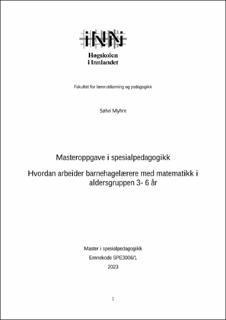| dc.description.abstract | Sammendrag
I denne kvalitative undersøkelsen har jeg utforsket hvordan barnehagelærere arbeider med matematikk i aldersgruppen 3-6 år. Formålet med oppgaven er å få tanker, erfaringer og opplevelser rundt dette arbeidet. Følgende problemstilling og forskningsspørsmål har preget dette arbeidet:
” Hvordan arbeider barnehagelærere med matematikk for aldersgruppen 3- 6 år i barnehagen?”
For å besvare problemstillingen min har jeg valgt å utforme tre forskningsspørsmål:
• Hvordan beskriver og oppfatter barnehagelærere matematikk?
• I hvilke situasjoner i barnehagen er det tilrettelagte aktiviteter med matematikk som hovedfokus?
• På hvilken måte blir matematiske aktiviteter organisert
For å samle inn datamateriale har jeg benyttet kvalitativ forskningsmetode, intervjuene ble gjennomført ved bruk av semistrukturert intervju. Det empiriske materialet består av 6 barnehagelærere ansatt som pedagogiske ledere i 6 ulike barnehager. I analysedelen valgte jeg og kombinere to vitenskapelige tilnærminger; fenomenologi og hermeneutikk (Kvale & Brinkmann, 2021).
Det teoretiske grunnlaget i min oppgave omhandler hva er matematikk med, matematikk i barnehagen, inkludert ulike matematiske områder. Barns matematiske utvikling, herunder kompetanse i tidlig alder og utvikling av de ulike matematiske områdene. En beskrivelse av matematikk for skolestartere. Matematikken i lek – inne og ute. Kartlegging i matematikk hos barn i barnehagealder, samt holdninger blant barnehagelærere. Til sist en del av matematiskplanlegg og organisering
Resultatene viser at informantene omfatter matematikk i barnehagen som resonering, undring og problemløsning. Tall og telling som det viktigste matematiske området. I lek og til rettelagte aktiviteter var det mest tilfeldige matematiske aktiviteter. Da det kommer til organisering var det lite matematetikk på planleggingsdager og personalmøter og ofte sentralstyrt tema fra kommunen.
Oppgaven kan bidra med å rette fokuset på hvordan det arbeidedes med matematikk i barnehagen og hvordan de ulike matematiske områdene påvirker den matematiske utviklingen til barna. I tillegg kan det rettes et nytt søkelys på personalets kompetanse, holdninger og forhold til matematikk, da dette kan påvirke barns læring og forhold til matematikk (Montaegeue – Smith & Price, 2012) | |
| dc.description.abstract | In this qualitative, study, I have explored how kindergarten teachers work with mathematics in the age group 3-6 years. The purpose of the assignment is to get thoughts, experiences and experiences around this work. The following issues and research questions have characterized this work:
"How do kindergarten teachers work with mathematics for the age group 3-6 years in kindergarten?"
To answer my problem, I have chosen to formulate three research questions:
• How do kindergarten teachers describe/perceive mathematics?
• In which situations in the nursery are there adult-led/organized activities with mathematics as the main focus?
• In what way are mathematical activities organised
To collect data material, I have used a qualitative research method, the interviews were conducted using semi-structured interviews. The empirical material consists of 6 kindergarten teachers employed as educational leaders in 6 different kindergartens. In the analysis section, I chose to combine two scientific directions; phenomenology and hermeneutics (Kvale & Brinkmann, 2021).
The theoretical basis in my thesis deals with what is mathematics, mathematics in kindergarten, including various mathematical areas. Children's mathematical development, including competence at an early age and development of the various mathematical areas. Mathematics in play – inside and outside. Mapping mathematics in children of kindergarten age, as well as attitudes among kindergarten teachers. A description of mathematics for school starters. Finally, a part of mathematical planning and organization
The results show that the informants include mathematics in kindergarten as reasoning, problem solving. Numbers and counting as the most important mathematical area. In play and for planned activities, the most random mathematical activities were. When it comes to organisation, there was little mathematics at planning days and staff meetings and often a centrally controlled topic from the municipality.
The assignment can help to direct the focus on how mathematics was worked in the kindergarten and how the various mathematical areas affect the mathematical development of the children. In addition, a new spotlight can be directed at the staff's competence, attitudes and relationship to mathematics, as this can affect children's learning and relationship to mathematics (Montaegeue – Smith & Price, 2012) | |
